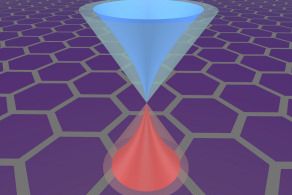Q&A: What will 'wonder material' graphene give us?
With a silicon replacement needed, graphene looks to be the most likely candidate. But what is it and why should we be excited about it?

Silicon, that element which we've relied on so heavily to help power our computers for years, is on the way out. At least, in terms of its presence in processors it is.
A replacement is needed to keep up with demand for increasing speeds and ever greater computing power.
Introducing graphene the so called "wonder material," which is expected to provide the basis for future processors in place of silicon.
A major research project, led by Nobel Prize winning scientists Professor Andre Geim and Professor Kostya Novoselov, has made yet more progress into understanding graphene's potential, uncovering additional details about its startling electronic properties.
Graphene is essentially a material made from a single layer of carbon atoms, in which electrons travel at incredible speeds. But what will it offer the world and why might we need it?
Daniel Elias, a University of Manchester researcher heavily involved in the graphene study, is a tad excited about the material.
We caught up with the research associate to learn about what graphene offers over silicon and how it could change the technological world.
Get the ITPro. daily newsletter
Receive our latest news, industry updates, featured resources and more. Sign up today to receive our FREE report on AI cyber crime & security - newly updated for 2024.
Essentially graphene is just a silicon replacement, right?
Yes, at least that is what we suspect because silicon is too old and it is now reaching the limit for the manufacturing of the faster transistors. The problem is not the engineering on silicon but the silicon itself.
I'm so impressed with graphene that I'm not even thinking about other materials.
We need a faster material that operates at room temperature. That material is graphene.
What actually is graphene? Where does it come from?
So graphite is basically layered material and every single atom layer of graphite is what we call graphene.
The first time researchers got a sample of graphene they basically used this Scotch tape technique. They took the tape and peeled a single layer of graphite off, which is basically graphene. That was the beginning.
Of course now people are trying different methods to get graphene to make it industry scale. The tape technique is a very academic way to produce it.
Why should we get excited about graphene?
The electrons in graphene are faster than in anything else. It's extremely thin, it's as thin as it's possible to be for a material and it has extremely good connectivity.
If you take the first paper on graphene in 2006 when they first described it, they found the velocity of electrons in the material was something like 1,000 times faster than silicon.
What we've found now is that it's 3,000 times faster, so it can be three times bigger than what we had expected.
IBM is already investing in efforts to make a commercial graphene device, but they didn't manage to get good enough quality samples.
But, of course, the industry will move really fast. If they want to use good quality graphene, they will find the velocity is three times faster than we thought and therefore extremely profitable for those enterprises.
Are there any alternatives to graphene?
I'm so impressed with graphene that I'm not even thinking about other materials.
Now it's also possible to combine graphene with a different material called boron nitride. Boron nitride is an insulator and graphene is a conductor - basically a transistor has to be made with an insulator and a conductor, because an insulator will control electrons in a conductor. With the two materials we now have a very thin material for a conductor and a very thin material for an insulator. It's really, really great.
Another possibility for replacing silicon would be to use light instead of electrons, but for this to work a computer would need to be as big as a room.
Graphene is so far the most reliable material to replace silicon.
Tom Brewster is currently an associate editor at Forbes and an award-winning journalist who covers cyber security, surveillance, and privacy. Starting his career at ITPro as a staff writer and working up to a senior staff writer role, Tom has been covering the tech industry for more than ten years and is considered one of the leading journalists in his specialism.
He is a proud alum of the University of Sheffield where he secured an undergraduate degree in English Literature before undertaking a certification from General Assembly in web development.





